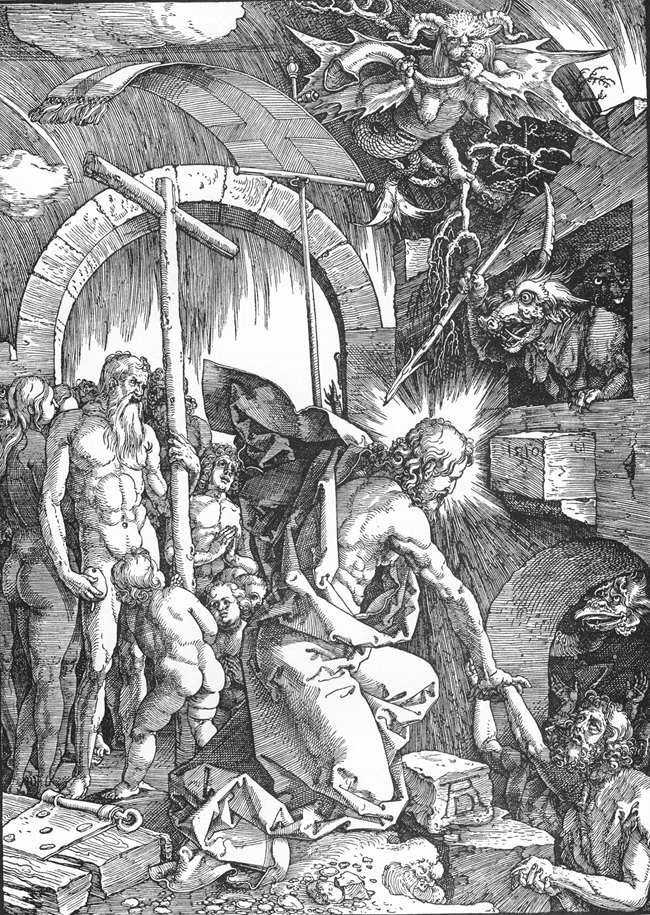***
***
Hi, Dave,I am still reading your book, Biblical Defense. I found an interesting use you make of Scripture. If you did it accidentally, you should be embarrassed. If you did it deliberately, you should be ashamed.
On p. 135, you quote Cardinal Newman with approval, referring to Paradise as a temporary abode of the dead, while they await judgment, but not Heaven. Then, I flip the page to 137, you quote Francis de Sales, WITH YOUR EDITORIAL INSERTION, EQUATING Paradise with Heaven. That is a disgusting jesuitical trick, claiming that Paradise is or is not Heaven, as it suits your purpose. However, by placing the two places so close together, you accidentally showed your hand.
Your apostasy has turned you into a vile and underhanded man. I hope your popish rewards are worth it.Sincerely,Chris Cole
Okay! First, let’s look at the passages he is referring to, from my book, A Biblical Defense of Catholicism. Cardinal Newman is commenting on 1 Peter 3:19-20, whereas St. Francis de Sales is interpreting 1 Corinthians 15:29. I’ve highlighted the directly relevant passages in blue.
Cardinal Newman comments:Our Savior, as we suppose, did not go to the abyss assigned to the fallen angels, but to those mysterious mansions where the souls of all men await the judgment. That He went to the abode of blessed spirits is evident, from His words addressed to the robber on the cross, when He also called it Paradise; that He went to some other place besides Paradise may be conjectured from St. Peter’s saying, ‘He went and preached to the spirits in prison, who had once been disobedient’ (1 Pet. 3:19-20). The circumstances, then, that these two abodes of disembodied good and bad, are called by one name, Hades . . . seems clearly to show that Paradise is not the same as Heaven, but a resting-place at the foot of it. Let it be further remarked, that Samuel, when brought from the dead, in the witch’s cavern, said, ‘Why hast thou disquieted me, to bring me up?’ (1 Sam. 28:15), words which would seem quite inconsistent with his being then already in Heaven.[Footnote: Sermon: “The Intermediate State,” 1836] (pp. 134-135]
[ . . . ]St. Francis de Sales:This passage properly understood evidently shows that it was the custom of the primitive Church to watch, pray, and fast for the souls of the departed. For, firstly, in the Scriptures, to be baptized is often taken for afflictions and penances; as in Luke 12:50 . . . and in St. Mark 10:38-9 . . . in which places our Lord calls “pains and afflictions” baptism [cf. Matt. 3:11, 20:22-3; Luke 3:16].
This, then, is the sense of that Scripture: if the dead rise not again, what is the use of mortifying and afflicting oneself, of praying and fasting for the dead? And indeed this sentence of St. Paul resembles that of 2 Maccabees 12:44 [cited above]: “It is superfluous and vain to pray for the dead if the dead rise not again.”…Now, it was not for those in Paradise [Heaven], who had no need of it, nor for those in Hell, who could get no benefit from it; it was, then, for those in Purgatory. Thus did St. Ephraim [d. 373] expound it
[Footnote: The Catholic Controversy, Henry B. Mackey, trans. (Rockford, Illinois: TAN Books, 1989), 368-369]
Remember, that our man Cole claims I am “vile and underhanded” in my interpretation, which is a “disgusting jesuitical trick” that ought to make me “ashamed.” All I did was make one bracketed clarification that St. Francis was referring to heaven in his use of “Paradise” in this citation. Obviously, he contrasts “Paradise” and “Purgatory” in the same paragraph, so he is not equating them. He means something else then, than that. It is either the “limbo of the fathers” or Sheol or Hades, the netherworld, or he means by it, heaven. That the latter is his meaning, he makes clear on the very next page, two paragraphs later:
If there are some sins that can be pardoned in the other world it is neither in hell nor in heaven, therefore it is in Purgatory.
Compare that to the passage in dispute (minus my bracketed interjection):
Now, it was not for those in Paradise, who had no need of it, nor for those in Hell, who could get no benefit from it; it was, then, for those in Purgatory.
When he used “Paradise” he was clearly using it as a synonym for “heaven.” Because some readers may not be aware that it has this meaning, I clarified in brackets. This is precisely what Chris Cole deems to be a dishonest “trick” and my supposed arbitrary twisting of one word this way and that to suit my nefarious “popish” purposes.
Of course, no such thing was done, and this can be easily shown from the Bible and Protestant or secular sources, as I will now proceed to do. Paradise can certainly be used as meaning heaven. Merriam-Webster Online provides three different meanings in its definition of paradise:
1a : eden 2
b : an intermediate place or state where the souls of the righteous await resurrection and the final judgment
c : heaven
Likewise, under heaven in the same reference, one of the synonyms for it is paradise. Dictionary.com (“paradise”) gives the same information:
noun1. heaven, as the final abode of the righteous.2. an intermediate place for the departed souls of the righteous awaiting resurrection.3. (often initial capital letter) Eden (def 1).
When multiple meanings of words exist, then context is supremely important to determine the meaning. Cardinal Newman’s context had to do with Sheol or Hades, whereas St. Francis was using the word as synonymous with heaven.
If our friend doesn’t care about secular dictionaries, then let him see what The New Bible Dictionary (edited by J. D. Douglas, Eerdmans Pub. Co., 1962, “Paradise”: 934-935), states:
In Lk. 23:43 the word ‘paradise’ is used by Jesus for the place where souls go immediately after death, cf. the concealed paradise in later Jewish thought. The same idea is also present in the parable of the rich man and Lazarus (Lk. 16:19-31).
The same article, however, cites the other two instances in the New Testament (2 Cor 12:2-4 and Rev 2:7) as referring to “heaven.” Let’s look at these three passages:
Luke 23:42-43 And he said, “Jesus, remember me when you come into your kingdom.” [43] And he said to him, “Truly, I say to you, today you will be with me in Paradise.”
2 Corinthians 12:2-3 I know a man in Christ who fourteen years ago was caught up to the third heaven — whether in the body or out of the body I do not know, God knows. [3] And I know that this man was caught up into Paradise — whether in the body or out of the body I do not know, God knows —
Revelation 2:7 He who has an ear, let him hear what the Spirit says to the churches. To him who conquers I will grant to eat of the tree of life, which is in the paradise of God.
Jesus didn’t ascend to heaven until His Resurrection, which was on a different day than His death. Therefore, He couldn’t be referring to heaven in that instance. But in 2 Corinthians, note how Paul uses interchangeably Paradise and third heaven. It’s a different meaning than in Luke 23:43. Likewise, paradise in Revelation 2:7 is heaven, since we know by Revelation 22:2, 14, and 19 that the “tree of life” is located in heaven.
The Greek word is paradeisos: Strong’s word #3857. Thayer’s Greek Lexicon (cited in the link to the left) gives the same variant meanings that I accept:
3. that part of Hades which was thought by the later Jews to be the abode of the souls of the pious until the resurrection: Luke 23:43, cf. 16:23f. But some (e. g. Dillmann (as below, p. 379) understand that passage of the heavenly paradise.
4. an upper region in the heavens: 2 Corinthians 12:4 (where some maintain, others deny, that the term is equivalent to ὁ τρίτος οὐρανός in 2 Corinthians 12:2); with the addition of τοῦ Θεοῦ, genitive of possessor, the abode of God and heavenly beings, to which true Christians will be taken after death, Revelation 2:7 (cf. Genesis 13:10; Ezekiel 28:13; Ezekiel 31:8).
Other lexicons agree. Kittel notes these different meanings, etc.
I’m afraid that the compelling “case” that my legion of anti-Catholic foes try to make; that is, that I am a lying, deceiving, scurrilous scumbag and all-around thoroughly wicked wascally wascal, will, I’m afraid, have to be made on grounds other than this.
Y’all keep on making your arguments against my character and basic abilities as an apologist (as you see it), and I’ll keep on exposing and broadcasting them as the ridiculous charades and farces that they are.
God sees all. He knows (whatever my mistakes and errors may be) that I am not a deliberate deceiver, and He sees when folks bear false witness against others. God is not mocked. Lying about others and slandering them are very serious sins indeed. You hurt your own soul and your own less-than-stellar anti-Catholic “cause” in acting like this. The sooner you learn that, the better.
*****














